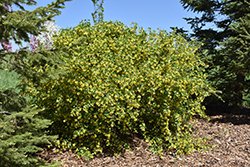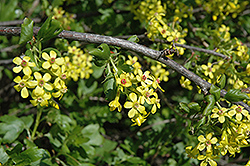>> Home
Height: 7 feet
Spread: 7 feet
Sunlight:
![]()
![]()
![]()
Hardiness Zone: 2a
Description:
An upright shrub with arching branches, features fragrant clove-scented yellow flowers in spring followed by small black berries, good fall color; ideal for a medium-sized hedge or screen; tends to sucker and open up with age, can be susceptible to mildew
Ornamental Features
Golden Flowering Currant has racemes of fragrant yellow tubular flowers hanging below the branches in mid spring before the leaves. It has bluish-green deciduous foliage. The lobed leaves turn an outstanding deep purple in the fall. It produces black berries in late summer.
Landscape Attributes
Golden Flowering Currant is a multi-stemmed deciduous shrub with an upright spreading habit of growth. Its relatively fine texture sets it apart from other landscape plants with less refined foliage.
This shrub will require occasional maintenance and upkeep, and should only be pruned after flowering to avoid removing any of the current season's flowers. It is a good choice for attracting birds to your yard. Gardeners should be aware of the following characteristic(s) that may warrant special consideration;
- Suckering
Golden Flowering Currant is recommended for the following landscape applications;
- Mass Planting
- Hedges/Screening
- General Garden Use
Planting & Growing
Golden Flowering Currant will grow to be about 7 feet tall at maturity, with a spread of 7 feet. It tends to fill out right to the ground and therefore doesn't necessarily require facer plants in front, and is suitable for planting under power lines. It grows at a medium rate, and under ideal conditions can be expected to live for approximately 30 years.
This shrub performs well in both full sun and full shade. It is very adaptable to both dry and moist locations, and should do just fine under average home landscape conditions. It is considered to be drought-tolerant, and thus makes an ideal choice for xeriscaping or the moisture-conserving landscape. It is not particular as to soil type or pH. It is highly tolerant of urban pollution and will even thrive in inner city environments. This species is native to parts of North America.

